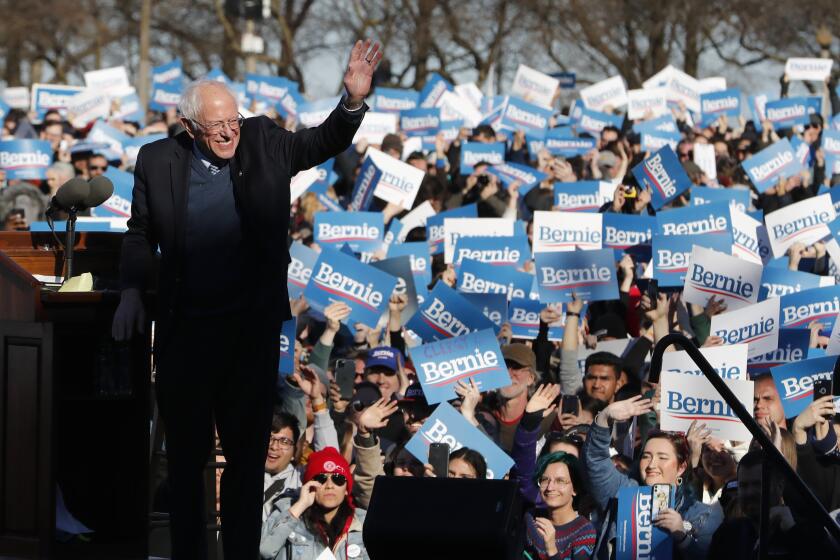Bernie Sanders endorses Joe Biden for president

- Share via
WASHINGTON — Sen. Bernie Sanders’ formal endorsement of Joe Biden for president marked a major step toward unifying the Democratic party in its drive to defeat President Trump and sharply reduced the risk that Democrats will be as weakened by intraparty tensions as they were four years ago.
Sanders’ endorsement came far earlier and was seemingly more heartfelt than in 2016, when he did not back his rival, Hillary Clinton, until July and then without the personal rapport he has shown for Biden.
“I thought we’d play some chess,” Sanders said jovially to Biden at the end of the amicable endorsement event, which was a split-screen appearance in a live stream billed as a talk on the coronavirus crisis.
Sanders (I-Vt.) urged Americans to join him in supporting Biden “to make certain we defeat someone I believe is the most dangerous president in the modern history of this country.”
The two announced they were establishing several task forces made up of advisors from both camps to hash out policy agreements on issues such as the economy, education, criminal justice, immigration, healthcare and climate change.
Bernie Sanders has inspired a legion of young progressives across the country who are running for political seats from city councils to Congress.
Sanders’ endorsement ends any doubt that lingered in the wake of his announcement last week that he was abandoning his bid for the presidential nomination, in a speech that fell short of a full-throated endorsement of Biden.
“Today, I am asking all Americans — I’m asking every Democrat, I’m asking every independent, I’m asking a lot of Republicans — to come together in this campaign to support your candidacy, which I endorse,” Sanders said to Biden.
Sanders’ move came almost exactly three months earlier than in the far-more-acrimonious 2016 primary campaign, allowing more time for the party to rally for the general election battle.
Aides said Biden and Sanders had always enjoyed a better personal relationship than Sanders did with Clinton. That sometimes made Sanders more reluctant to attack Biden during the primary campaign than some of his supporters would have liked, and, indeed, even in the aftermath of the endorsement some of Sanders’ prominent backers declined to follow suit.
Briahna Joy Gray, Sanders’s campaign press secretary, for example, wrote on Twitter: “With the utmost respect for Bernie Sanders, who is an incredible human being & a genuine inspiration, I don’t endorse Joe Biden. I supported Bernie Sanders because he backed ideas like #MedicareForAll, cancelling ALL student debt, & a wealth tax. Biden supports none of those.”
The rapprochement of the two candidates was also hastened by the fact that Trump’s threat to Democrats’ values and agenda is more vivid now than it was four years ago, when few thought he would win the election.
Senior advisors to Biden and Sanders have been meeting for weeks to find commonalities on policy and lay the groundwork for an endorsement.
Biden, who has struggled to win support from the progressives and young voters who flocked to Sanders, expressed gratitude to the senator.
“It’s a big deal,” Biden said. “I’m going to need you badly.”
The two erstwhile rivals, speaking from their respective homes where they are confined during the pandemic, had a lengthy conversation that emphasized their shared views on many issues. They avoided engaging on differences over issues such as Sanders’ signature proposal to expand Medicare to all Americans.
“I know we share the same goals on many of these things,” said Biden. “We’ve had different ideas on how to accomplish them. But on some issues we’re going to continue to disagree respectfully, but not in any substantive way.”
For the Biden campaign, the high-profile endorsement provided a welcome change of topic from reports that surfaced over the weekend that a former Senate staffer had accused Biden of sexually assaulting her during the early 1990s when he was a Delaware senator. The Biden campaign flatly denies the allegation.
Get our L.A. Times Politics newsletter
The latest news, analysis and insights from our politics team.
You may occasionally receive promotional content from the Los Angeles Times.
The detente with Sanders came after Biden took a series of steps to reach out to the party’s left wing.
Last week, Biden proposed an expansion of Medicare and student debt relief in proposals that fell short of what Sanders proposed, but marked movement in his direction.
But the fact that some Sanders supporters saw Biden’s proposals as inadequate points to a big remaining question: Will Sanders’ endorsement bring along the young and progressive voters Biden needs in sufficient numbers to beat Trump?
Many of Sanders’ supporters are independents, not Democratic party regulars, so it remains to be seen how thoroughly their political hero’s endorsement will lure them into the Biden camp.
While some of Sanders supporters may stay home rather than vote for Biden, others could defect to Trump.
A recent Washington Post/ABC News poll found that if Biden were the Democratic nominee, 80% of Sanders supporters would vote for Biden, and 15% would go to Trump. Typically, however, in past elections, the number of people who defected from the party’s nominee in the fall was considerably smaller than the number who said they would do so in the spring.
Sanders also faces the challenge of helping Biden motivate young voters who did not turn out for the Democratic primaries. Sanders has acknowledged that, for all his appeal to young voters, he was disappointed that their turnout still fell short in this year’s primaries.
“Have we been as successful as I would hope in bringing young people in? The answer is no,” Sanders said at a news conference in early March.
“I think that will change in the general election, but I will be honest with you, we have not done as well with bringing young people into the process.”
More to Read
Get the L.A. Times Politics newsletter
Deeply reported insights into legislation, politics and policy from Sacramento, Washington and beyond. In your inbox three times per week.
You may occasionally receive promotional content from the Los Angeles Times.












